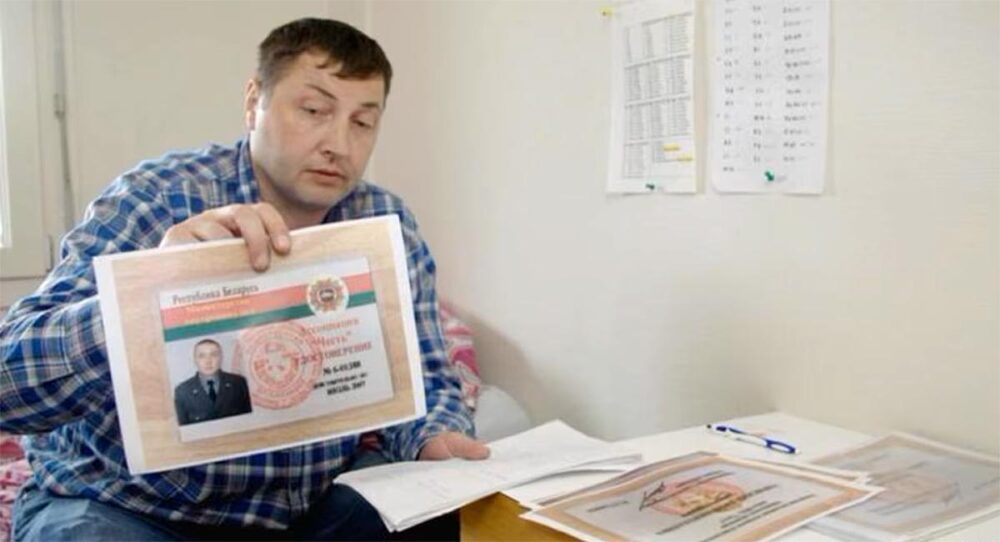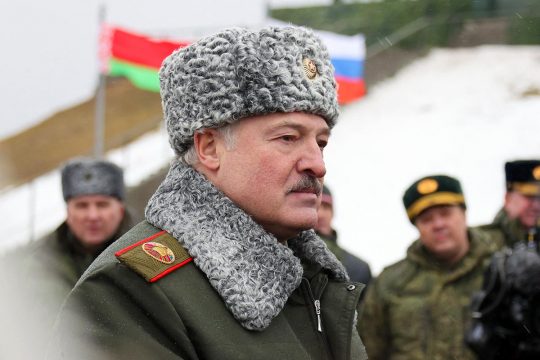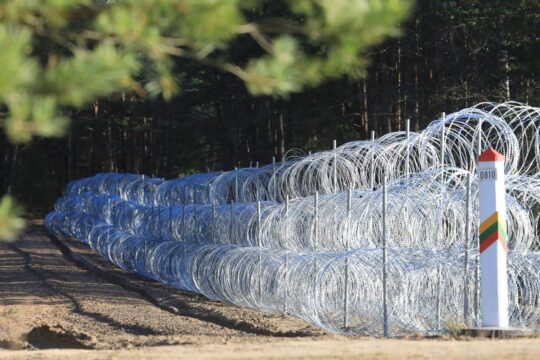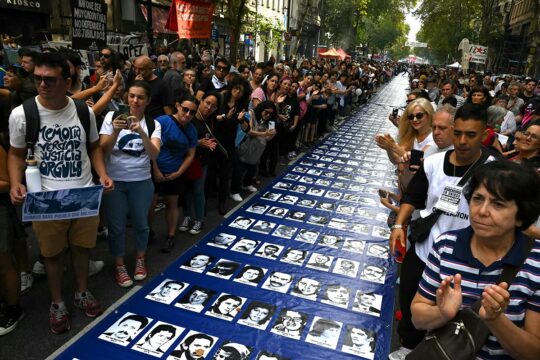Yuri Harauski, 44, was a member of the Interior Ministry’s SOBR special unit, set up in 1998 on the orders of the Belarus State to fight organized crime and sometimes described as president “Lukashenko’s hit squad”. He is accused in Switzerland of having participated in the kidnapping and murders of former Interior Minister Yury Zakharenko, former Deputy Prime Minister Viktar Gonchar and Anatoly Krasouski, a businessman and close friend of Gonchar. Zakharenko and Gonchar in particular were emblematic opposition figures. After leaving the government (one was dismissed, the other resigned), they became pro-democracy activists and vocal opponents of Lukashenko.
“He also kept the story secret and retained information about the fate and whereabouts of the victims until 2019, when he appeared publicly in the media saying he actually participated in the murders,” says Benoit Meystre of Geneva-based TRIAL International, one of the NGOs that helped bring the case. TRIAL International is not a party in the trial, but filed a joint complaint with the International Federation for Human Rights (FIDH) and Belarusian human rights centre Viasna. Families of the disappeared had made numerous attempts in vain to obtain information about the whereabouts of their missing relatives, states TRIAL.
The case comes after criminal complaints from two of the victims’ relatives and these NGOs which supported them. The accused Harauski is resident in Switzerland since 2018 or 2019, according to different media reports. FIDH says that according to information available “he arrived in the country to seek asylum, arguing that his life was at risk given his will to speak out about his past involvement with the SOBR unit”.
Harauski talks
In 2019, Harauski told Deutsche Welle that he had been involved in the three disappearances, providing extensive details on the kidnappings and killings. “It emerged from this interview that Yuri Harauski was living in a German-speaking region of the Alps,” says FIDH. “After an investigation, TRIAL International was able to confirm his presence in Switzerland, in the canton of St. Gallen”. After Harauski’s presence in Switzerland was confirmed in spring 2021 and the complaints were filed, he was briefly arrested in June 2021 to be examined by the prosecutor, according to FIDH.
“Yuri Harauski made a full confession and provided detailed descriptions of the crimes he is accused of,” it says. He was then allowed to remain free. The accused was examined by the prosecutor a second time in October 2021. A witness was heard in April 2022. The investigation was concluded in spring 2022 and the suspect was charged on May 2, 2022. Prosecutors also examined reports by NGOs and international bodies like the United Nations on enforced disappearances in Belarus.
First enforced disappearance case in Switzerland
“For the victims this trial is a milestone,” says St Gallen-based lawyer Severin Walz, who is representing two daughters of the disappeared in this Swiss case, “because it’s the first time in more than 20 years a person is being held accountable in a due procedure for the disappearance of their fathers”. He says it’s the first time the truth about what happened could be established in court.
This case marks firsts for Belarus and for Switzerland. “The case is ground-breaking,” says TRIAL International in its August 30 press release. “For the very first time, a Belarusian national stands trial for enforced disappearance on the basis of universal jurisdiction.” According to FIDH, there is another case in Lithuania against Belarusian security officers including Deputy Interior Minister Nikolay Karpenkov for alleged torture during the protests against Lukashenko’s disputed re-election in 2020. However, the suspects are still in Belarus.
TRIAL International points out that this is also “the first application of the provision criminalizing this offence [of enforced disappearance] in Switzerland”. This provision was introduced in 2017 after Switzerland signed up to the International Convention for the Protection of All Persons from Enforced Disappearance. It allows the crime of enforced disappearance to be prosecuted under the principle of universal jurisdiction in certain conditions as a stand-alone crime, as well as a component of international crimes. This is why Harauski is being tried in a St. Gallen cantonal court and not Switzerland’s Federal Criminal Court, which would be the case if he were charged with international crimes.
“It also has European significance. I believe it is the first time that such an article [Article 185bis of the Swiss Criminal Code] is applied in a State that has signed this convention,” lawyer Walz tells Justice Info. “An element of the crime is that the State is involved in the disappearance, and if he [Harauski] is convicted, that element is fulfilled,” adds Walz. “That would mean the finger would be pointed at high-up officials, even Lukashenko himself, as having ordered the crimes.”
Harauski implicates others
The prosecutor’s office confirmed to Justice Info by e-mail that Harauski has confessed and cooperated with the investigation. It also said he had implicated others, including Dmitrij Pavličenko, commander of the Interior Ministry’s SOBR special unit.
According to the indictment, Harauski was among a group of eight SOBR agents who arrested Zakharenko near his home on May 7, 1999, on Pavličenko’s orders. They knew where he lived, as they had followed him previously. Zakharenko was handcuffed, put into a car and a hood placed over his head. The SOBR agents then drove to the training centre of Interior Ministry troops in the Volovshchina region. There, Pavličenko shot Zakharenko twice in the back, around the heart area, using a pistol with a silencer. After checking he was dead, the SOBR men took his corpse to the north cemetery of Minsk. All those who had participated in the mission received $500 in cash.
“Yuri Harauski didn’t know before Yuri Zakharenko’s abduction that he was to be killed,” says the indictment. “But when he was dead, he and all the other participants realized that not a word should filter outside about Yuri Zakharenko’s abduction and murder. Yuri Zakharenko has been unaccounted for since this 09.05.1999. His death has never been officially confirmed.”
On September 16, 1999, the SOBR had a new mission, again on Pavličenko’s orders. They were told that whoever wanted to could participate. The SOBR agents, including Harauski who was given a pistol with a silencer, were sent to a sauna in Minsk where the friends Anatoly Krasovsky and Victor Gonchar would go regularly. They arrested Gonchar, hit him, shackled him and put him in Pavličenko’s car, where he was hooded and gagged. A second car took care of Krasovsky. The victims were taken to the Begomi base of Interior Ministry troops, some 100 km north of Minsk. There, Pavlicenko took the pistol from Harauski and used it to shoot Krasovsky and Gonchar dead. Their corpses were thrown into a prepared pit and their clothes were burned. “A couple of days later, each person who participated in the mission received USD 1,000 in cash from Dmitrij Pavlicenko,” according to the indictment.
Confession allows quick trial
The fact that Harauski has confessed means the procedure is relatively fast. This trial is scheduled for September 19 and 20. It could be extended if the parties request more evidence and the court accepts. However, informed sources think this unlikely. Victims will be present and the accused himself is to testify.
If convicted, Harauski faces a possible sentence of between one and 20 years. The prosecutor’s office said in its E-mail that it will be asking for a three-year sentence, with two suspended. Harauski’s defence lawyer told Justice Info she would not comment before the trial. However, the defence is also likely to plead for court leniency, owing to Harauski’s confession and willingness to give information.
Victims’ lawyer Walz says the court is likely to decide on the basis of the investigation and the testimony of the accused. It is expected that the verdict will also be delivered quickly, possibly on the evening of September 20.








